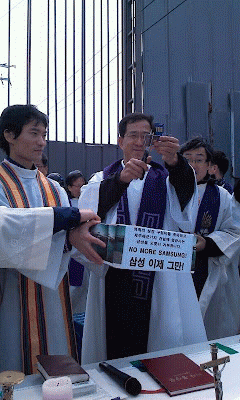Priests cut Samsung credit card in half during mass at Navy base destruction gate
President Obama, like President Bush, has a penchant for identifying areas of the world for America's special attention. In the 2002 State of the Union message, Bush used the phrase "Axis of Evil" to signal where America's military might was to be focused in the next years. Afghans, Iraqis and Iranians know that bad things happen for areas of the world singled out for America's special attention. On the peninsula where North Korea, Bush's other "Axis of Evil" country is located, Obama has declared the Asia-Pacific region as its special area of interest for the next decade and bad things are already happening.
Last week President Obama met in "democratic" South Korea to discuss "non-democratic" North Korea. Yet, while Obama was in South Korea, some very undemocratic actions were perpetrated on behalf of America's Pacific military strategy by members of the South Korean government toward South Korean citizens, and even American citizens. These citizen activists have been protesting America's Missile Defense System and a provocative new naval base in South Korea for ships carrying the American Aegis missile that brings the American missile system very close to America's latest "enemy" -- China.
As governments and militaries are wont to do, just because they can, they choose beautiful areas in which to locate their bases -- and Jeju Island is no exception. Designated as a world heritage site with six unique biospheres, including endangered species of marine life and the world famous women free divers who harvest marine life, it is a tropical volcanic island, also known, ironically, as the Island of Peace.
Despite its special natural
beauty, Gureombi, the unique 1.2 kilometer-long basalt volcanic rock formed by
lava flowing into the sea and rocks rising from the seabed, at the village of
Gangjeong was selected to be blown up in order to build the naval base.
South Korean Activists Bravely Attempt to Stop Naval Base Construction
For five years, South Korean activists have been protesting the designation of Guroembi as the site of the new naval base. The South Korean police and military actions against their own citizens have gotten progressively heavy-handed and brutal. Hundreds have been arrested over the years including many Catholic priests and nuns who travel on peace flights from the mainland.
Last week, police broke arms of activists who had locked arms inside PCV pipes, beat up activists and threw them from kayaks.
Today, on April 3 in Gangjeong, the citizen struggle against the construction of the base continued. Nine Presbyterian pastors were arrested for breaking through the fence at the construction site in the early morning. The tent set up by 80 Catholic priests and nuns for their mass was demolished by police. A candlelight vigil was held in Jeju city on the 64th anniversary of the April 3 massacre in which 30,000 Jeju Island citizens were killed. Pastors are still engaged in a sit-in at the gate of the naval base site.
International Activists Deported from South Korea
As the
South Korean government gets more fearful of the international publicity of
their actions, they are deporting international activists and denying entry to
South Korea to other activists. Two
weeks ago, three members of Veterans for Peace, Elliot Adams, Tarak Kauff and
Mike Hastie were put back on airplanes that had brought them to South
Korea. Kauff, who served in South Korea
with the US Army, said, "I served in the Second Infantry Division in Korea
defending the people from North Korea, I come back again to defend the people
and now I am pushed off into a no-man's land."
Japanese activist Ryuji Yagi was denied entry on March 31. UK Trident Plowshares activist Angie Zelter was deported after being on Jeju Island for several days.
US Complicit in Massacre of 30,000 Jeju Island residents 64 years ago
The South Korean police crackdown on dissent against construction of the naval base on Jeju, which has never had a military base before, reminds residents of the island of the notorious government crackdown on dissent in 1948 when the South Korean military was sent by the US installed leader of the new country of South Korea, right-wing Syngman Rhee, to Jeju island to squash islanders who were demanding the reunification of Korea and who were objecting to the partition of Korea. In one year, the Seoul government's military and national police hunted down and murdered over 30,000 persons, nearly 15 percent of the island's population.
The U.S. was
the occupying power during the systematic murder program, now known as the April
3 Massacre, and did nothing to stop the massacre.
In 2005, Roh Moo-hyun, then South Korea's president, finally apologized for the South Korean government's massacre of the people of Jeju Island and designated Jeju as an "Island of World Peace."
(Note: You can view every article as one long page if you sign up as an Advocate Member, or higher).






